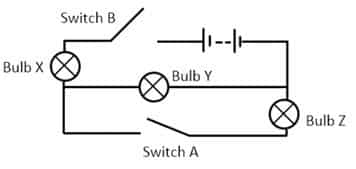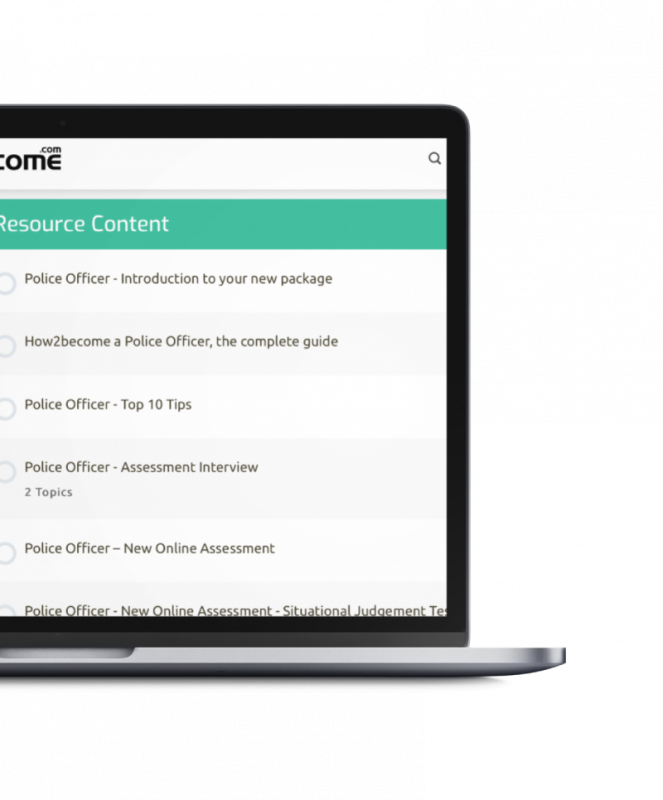
HOW TO PASS ELECTRICAL COMPREHENSION TESTS
100s of sample test questions and answers with detailed explanations for electrical comprehension questions.
4.9/5 Rating | 1,000+ Reviews ![]()
Training That Works
Discover insider secrets and a masterclass of electrical comprehension practice material that has helped 100s of candidates pass their assessment tests.
Unlock Your Potential
Whether you’re just starting out or you know what to expect, you will get access to 100s of questions, fully-worked solutions that will catapult your chances of success.
Powerful Resources
Get instant access to the material right now which includes practice questions, answers, and solutions at beginner, intermediate and advanced levels.
ELECTRICAL COMPREHENSION TESTS

WHAT ARE ELECTRICAL COMPREHENSION TESTS?
Anyone who is applying for a job that requires strong levels of electrical and technical ability will most likely be expected to undertake an Electrical Comprehension Test.
Jobs that often require candidates to sit an Electrical Comprehension test are as follows:
- Royal Air Force;
- Armed Forces;
- Technical Positions;
- Electricians;
- Signal Repairers;
- Wireman;
- Engineers;
- Electrical Engineering;
- Physics.
Please note, that the list above is not exhaustive. Other jobs may require you to sit an Electrical Comprehension test too. Remember to find out as much information regarding the selection process for the job you have applied for. If you know that you have to sit some form of psychometric assessment, this will enable you to prepare to the fullest.
ELECTRICAL COMPREHENSION TOP TIPS
The following is a list of key bullet points that we believe will assist you through the preparation period of conducting an Electrical Comprehension test. There are more top tips and advice in our guide which we highly recommend on reading to ensure you are fully equipped for the entire process.

TOP TIP 1
Carry out lots of sample testing questions which focus on the subject you are preparing for. In regards to electrical tests, it is vitally important that you understand what the question is asking. You need to read the question carefully to ensure you have read it correctly.
TOP TIP 2
Whilst undertaking sample tests, it is important that, if you get a question wrong, you spend time working out why you got it wrong. Within this guide, we have provided answers and detailed explanations to assist you through your learning process. If you get a question wrong, consider ‘why’ you have got it wrong. Read through the answers and explanations in order to improve your overall knowledge.


TOP TIP 3
When practising, you must ensure that you work on your speed as well as your accuracy. Most tests are administered under time limits, and therefore you will be expected to answer as many questions as possible within the allotted time given. Having said this, you do not want to sacrifice the accuracy of your answers. Do not rush through the questions; you want to avoid making careless mistakes.

PASS YOUR ELECTRICAL COMPREHENSION TEST

- TIPS top tips for passing the tests including what you should do and what you should try to avoid;
- 200 TESTING QUESTIONS – the workbook purposely provides you with lots and lots of sample questions for you to get your head around, and to ensure you are ready to take your actual Electrical Comprehension test;
- IDEAL for anyone who wishes to successfully pass an Electrical assessment;
- DETAILED EXPLANATIONS – this book contains all the answers and explanations of how to work out every single question, so you are able to correct your mistakes and know how to work the question out for future reference;
- A COMPREHENSIVE GUIDE! This guide is packed with all the information, advice and questions you will need to prepare for, and pass your Electrical Comprehension test.
Sample Electrical Comprehension Questions
To help you get a better understanding of what an electrical comprehension test involves, let’s take a quick look at a few sample questions.
FREE | 4 Questions
Electrical Comprehension Practice Questions
What are the basic particles that make up an atom?
A – Protons, neutrons and particles.
B – Protons and electrons.
C – Neutrons, protons and electrons.
D – Mesons, neutrons and electrons.
What are the minimum and maximum acceptable values if a resistor has the resistance of 14 kΩ and can tolerate ±20%?
Minimum value =
Maximum value =
John turns on his electrical heater. The electrical heater uses a supply of 310 voltages, and the current is 11 A. John wants to work out the resistance of his electrical heater. Calculate the resistance of the electrical heater. Rounded to two decimal places.
ANSWERS
C – Neutrons, protons and electrons.
D – no bulbs will illuminate
Minimum = 11.2 kΩ
Maximum = 16.8 kΩ

Pass Your Electrical Comprehension Test. First Time.
Crafted for everyone, no matter your skill level or background, this download was made to help you achieve one goal: pass your electrical comprehension test.
WHAT WILL YOU LEARN?
Scoring Criteria
Essential information about how you will be assessed during an electrical comprehension assessment.
UP-TO-DATE FOR 2024
All exercises have been verified by our assessment panel experts for the 2024 tests.
PRACTICE SAMPLE TEST QUESTIONS
Step-by-step information on how to pass any style of electrical comprehension assessment.
FULLY-WORKED SOLUTIONS
Fully-worked solutions for all questions so you can be confident in learning and improving your score.
INSIDER SECRETS
Insider tips on how to answer the questions and a breakdown on how you will be scored.
SCORE-BOOSTING STRATEGIES
Get ahead of the competition with unique and proven strategies 16 years in the making.
Customer Success Stories
Having helped 1,000s of people pass their assessment tests for over 16 years, it is no wonder our customers love us…

Great product.

Prepares you well for psychometric testing (electrical).

Not a bad book, the basics is good if you have no knowledge to start with, the advanced gets a bit hard for a novice but there is stuff to learn. A good book if you have an aptitude test coming up as it does prepare you.

These are fun to do, more like engineering soduko for those of us who work in the field.
This is a good book to start learning with if your interested.

Great book, plenty of tests and relevant questions.
This book includes basics and advanced electrics knowledge from symbols, health and safety. There are loads of questions and answers which give detailed examples.
This book would recommend to anyone needing assistance on passing the test or just wanting to learn about electric.

WHAT’S INCLUDED IN YOUR DOWNLOAD?
Complete guidance to ensure you pass the selection tests.
- HUNDREDS OF SAMPLE QUESTIONS – each with a detailed answer to ensure you learn from the questions you get wrong.
- In-depth responses and explanations to each and every question.
- Revealed – Tips to help you successfully pass the tests.
- Essential tips on how to use important calculations, to accomplish your goals.
- Strategies for working fast, and under pressure.
- Beginner, intermediate, and advanced questions covering everything from symbols and circuits, to currents and capacitances.
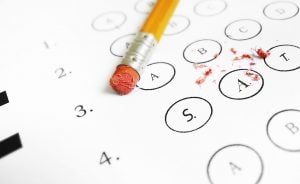
PLUS…BONUS!

BONUS
PLUS…30-Day Free Subscription Trial To The Online Psychometric Tests Testing Platform!
As well as life-time access to the Electrical Comprehension Tests download, this product also includes a 30-day free trial to Online Psychometric Tests Testing Platform (usually £9.99 + vat per month).

- 100s of additional practice questions to help boost your scores!
- Practice all of the test questions under timed conditions using our online testing suite.
- Instant online access.
- Compatible on mobiles, tablets and computers.
- Scores are tracked so you can focus on areas that need improvement.
Important: This powerful free trial costs £9.99 + vat every month for everyone else! You will get unrestricted access to all of the quick-win strategies to give you the advantage right away.
Worth £9.99, Yours FREE for 30-days*
*We want you to know: This is a subscription service that is charged at just £5.95 + vat per month after the 30-day trial expires. No minimum term. If you cancel before the 30-day trial ends, you will not be charged. Please see our terms for full details.
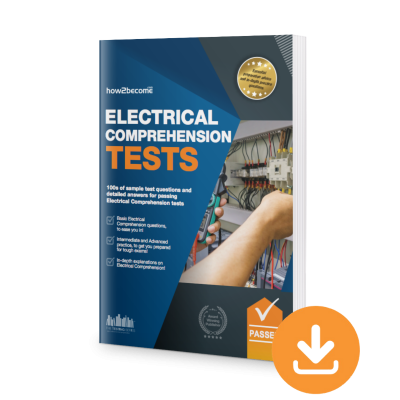
✓ 30-Day Money-back Guarantee
Did you know? All orders with How2Become are protected by our 30-day money-back guarantee. What ever the reason…or no reason at all…you can have your money back if this resource isn’t right for you (see our terms for full details).
WHY BUY WITH HOW2BECOME?
CREATED BY THE EXPERTS
PROVEN TRAINING
EXCLUSIVE FREE BONUSES
Firstly, these guides are created by us and our team of experts – we have all the answers to your questions and will help you succeed (like we’ve been doing for the last 16 years), we update our material frequently and you can contact us at any time with any questions you have.
Secondly, we provide exclusive bonuses with all our products that you won’t find anywhere else. These bonuses include free guides, powerful online testing suites and more!
Finally, our guides and training just work. Take a look at our TrustPilot page where you will see our rating of 4.9/5. There, our customers share their positive buying experiences and more importantly the time-saving success our resources have given them (hint: they passed their assessment).
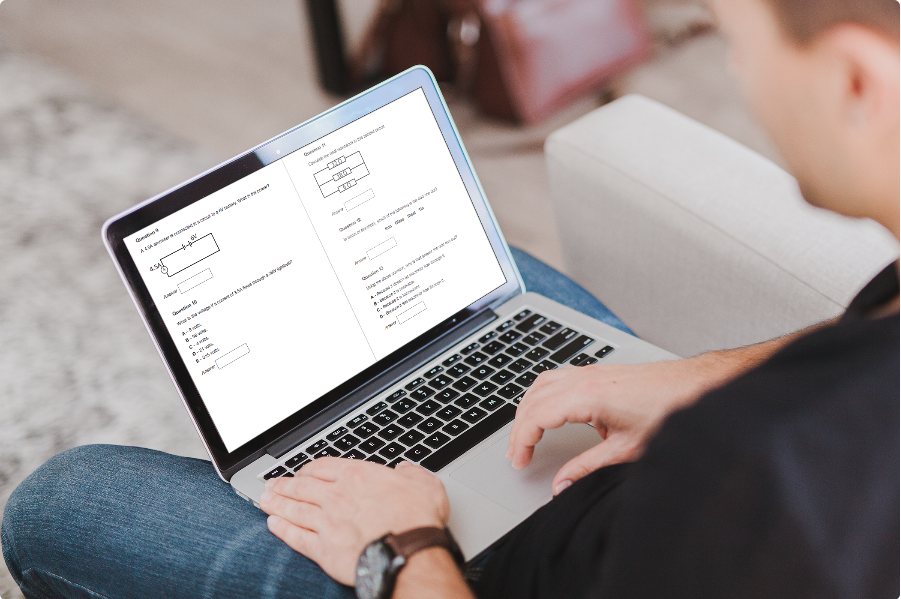
Learn how to PASS YOUR ASSESSMENT
We’ve helped 1,000s of aspiring applicants in their journey to succeed in a new career. Trust the UK’s #1 careers and education specialists to help you secure your role.
Get instant access »“A highly detailed guide that was essential for my son’s revision. The quality, level of detail and explanation is brilliant. I would certainly recommend!”













